
Project: Reducing Embodied Carbon in Purchasing
Elanna Mak conducted outreach to promote the switch from plastic to recycled lab supplies and explored factors impeding sustainable alternatives for compounds.
Lead a real sustainability transformation right here on campus.
As a Sustainable Stanford Living Lab Fellow, you work at the intersection of research, operations, and real-world change. Fellows lead applied, cross-disciplinary projects that advance Stanford’s sustainability goals and deliver measurable impact. This is a chance to influence systems, policy, and culture while gaining hands-on experience, strategic insight, and leadership skills as a sustainability change-maker.
More about the program’s origins can be found in its launch article in the Stanford Report.
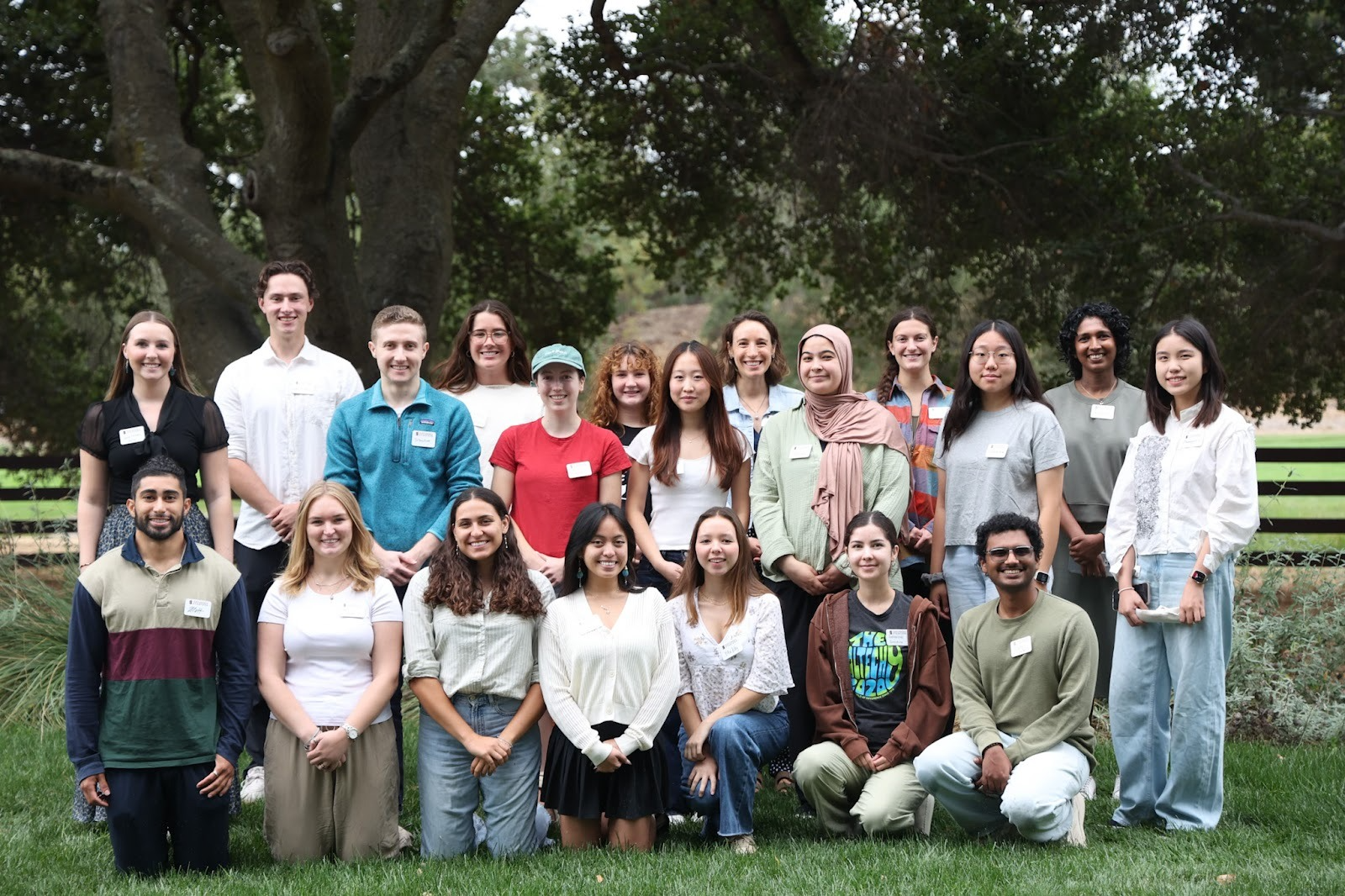
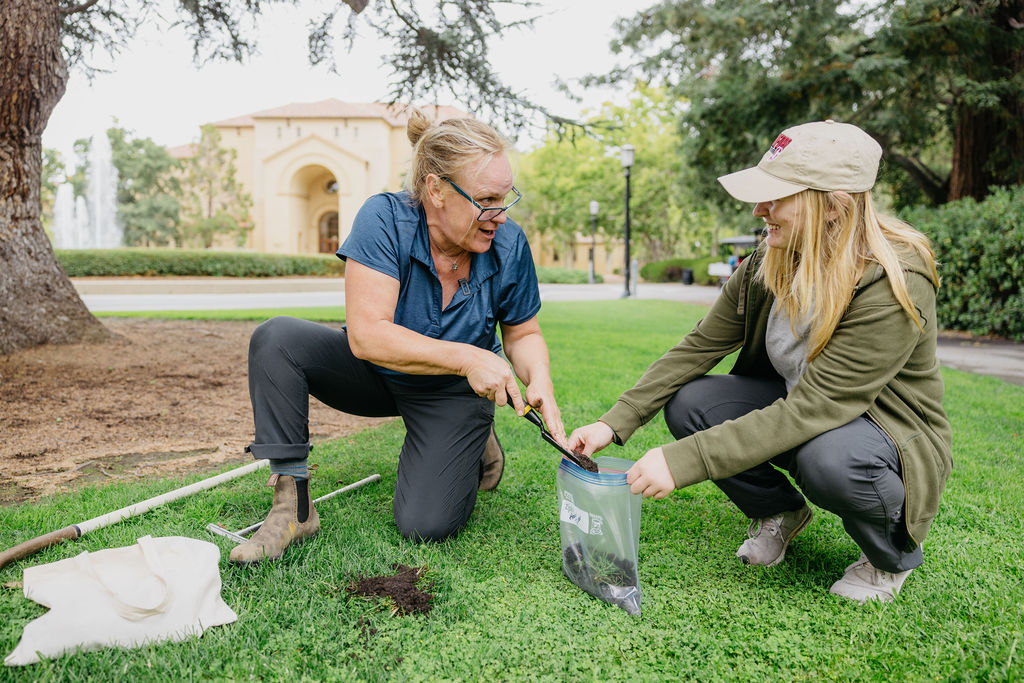
As part of the Sustainable Stanford Fellowship program, you will have the chance to develop essential leadership skills, including systems thinking, problem solving, project management, and effective communication. You will receive dedicated mentorship from sustainability experts and will join a connected community with access to campus sustainability professionals and exclusive events. Lastly, the program will help you build your career and portfolio by showcasing your impactful work that shapes Stanford’s sustainable future.
Develop Key Leadership Skills: Strengthen your systems thinking, applied problem solving, project management, and change management skills while learning to collaborate, communicate, and facilitate across diverse teams. Along the way, you will engage with key stakeholders, practice analyzing data and reporting impacts, and learn to navigate real operational constraints.
Receive Mentorship and Support: Receive one-on-one mentorship from experienced sustainability practitioners, along with guidance from an advisory board of subject matter experts who help you refine your approach and expand your perspective.
Join a Connected Community: Become part of a vibrant community of campus sustainability professionals and partners, with opportunities to engage through exclusive Living Lab events such as orientation, the Next-Gen Forum, and the annual Symposium.
Build Your Career and Portfolio: You will have multiple opportunities to showcase your work, develop portfolio-ready deliverables, and gain visibility across campus, contributing directly to programs and strategies that shape sustainability at Stanford.
Leave a Lasting Impact: Contribute to meaningful, tangible improvements that advance Stanford’s sustainable future, leaving a clear and lasting impact on the campus community.
Topic Area: Climate Action; Sustainable IT (Emissions Management, Behavior Change, Communication & Outreach)
Collaborating Unit: Land, Buildings & Real Estate – Office of Sustainability
This project will develop Stanford-specific best practices for responsible and resource-efficient use of artificial intelligence across academic and administrative contexts. The fellow will analyze how AI usage translates into energy and water demand, then translate these findings into practical guidance for platform selection, prompt design, and computational intensity management. The goal is to support informed behavior change without adding burden to users. Preferred skills include research and data analysis, Excel, communications, and interest in AI systems, sustainability, and behavior change.
Topic Area: Climate Action & IT (Sustainable Research Computing, Emissions Management)
Collaborating Unit: Stanford Doerr School of Sustainabilty – Center for Computation
This project will enhance an existing AI-powered assistant used for supercomputing job requests by embedding sustainability intelligence into how compute resources are requested and allocated. The fellow will test real and synthetic job configurations, identify inefficiencies such as conflicting or redundant parameters, and help train the assistant to flag energy-intensive requests and suggest more efficient alternatives. Additional work includes user testing and feedback collection to improve usability and adoption. Preferred skills include data processing, familiarity with AI or computing systems, analytical thinking, and interest in the intersection of research computing and energy efficiency.
Topic Area: Climate Action (Healthcare, Information Technology, Emissions Management)
Collaborating Unit: Stanford Health Care – Sustainability Program Office
This project will assess the current and projected carbon footprint of artificial intelligence technologies used in Stanford Health Care operating rooms, including robotics, imaging, monitoring, and data platforms. The fellow will review literature, estimate energy and emissions impacts specific to SHC, and identify strategies to reduce AI-related carbon intensity through procurement, system design, and operational practices. Deliverables include a carbon footprint assessment and actionable recommendations aligned with SHC’s net-zero goals. Preferred skills include GHG emissions accounting, data analysis, modeling, and familiarity with computing or healthcare technology systems.
Topic Area: Climate Action (Degasification/Electrification)
Collaborating Unit: Bill Lane Center for the American West; Land, Buildings & Real Estate – Office of Sustainability
Stanford University has over 850 on-campus residences housing its faculty and staff. As part of Stanford’s strategy to achieve net-zero emissions by 2050, electrifying these homes is a key priority. Building off of existing progress, the fellow will collaborate with the Office of Sustainability and the Stanford Campus Residential Leaseholders (SCRL) to advance electrification efforts by promoting available incentives and programs to faculty and staff residing on campus.
Topic Area: Climate Action (Construction, Embodied Carbon)
Collaborating Unit: Land, Buildings & Real Estate – Office of Sustainability and Department of Project Management
This project will advance Stanford’s ability to measure and reduce Scope 3 emissions from construction by building a comprehensive embodied carbon baseline across campus buildings and infrastructure. The fellow will use a new embodied carbon tracking platform (C.scale) to input and analyze Whole Building Life Cycle Assessment (WBLCA) data, establish baseline emissions factors by building type, and support the transition to Carbon Use Intensity (CUI) targets per square foot. Deliverables include a portfolio of embodied carbon benchmarks, updated WBLCA guidance, and a scalable data collection process for project managers. Fellows should bring strong data analysis skills and familiarity with GHG accounting, LCAs, Scope 3 emissions, and embodied carbon concepts.
Topic Area: Climate Action; Sustainable Purchasing (Healthcare, Emissions Management)
Collaborating Unit: Stanford Health Care – Sustainability Program Office
This project will improve how greenhouse gas emissions from purchased goods and services are measured in the healthcare sector, with a focus on enabling more actionable Scope 3 emissions accounting at Stanford Health Care. The fellow will analyze existing methodologies, conduct a gap analysis, and engage suppliers to collect product- or supplier-specific emissions data. The work will also assess supplier climate targets and identify opportunities to accelerate emissions reductions. Preferred skills include GHG accounting, Excel-based analysis, data synthesis, and interest in sustainable procurement and supply-chain decarbonization.
Topic Area: Climate Action (Land Use, Zero Waste, Energy Production From Waste)
Collaborating Unit: Land, Buildings & Real Estate – Office of Sustainability; Stanford Doerr School of Sustainability – Stanford Educational Farm
This project will examine manure management practices to identify opportunities to reduce emissions, improve soil health, and recover energy or nutrients. The fellow will analyze current handling methods, review best practices, and evaluate alternatives such as composting, anaerobic digestion, or land application improvements. Deliverables include an assessment report and recommendations aligned with Stanford’s climate and land stewardship goals. The ideal fellow will bring strong data analysis skills, an understanding of how capital projects are budgeted and financed, familiarity with energy utilities and markets, and a basic working knowledge of composting and anaerobic digestion systems.
Topic Area: Climate Action (Emissions Management, Communications, Policy And Planning)
Collaborating Unit: Land, Buildings & Real Estate – Office of Sustainability; Stanford Doerr School of Sustainability
This project will develop a framework to quantify and communicate the public health co-benefits of Stanford’s Climate Action Plan by estimating health impacts associated with Scope 1 and 2 emission reductions. The fellow will work with campus emissions datasets and apply established air quality and public health models to assess improvements in air quality and related health outcomes. Deliverables will include quantitative estimates and clear, accessible visuals and narratives that strengthen campus understanding of how decarbonization also benefits human health. Strong data analysis skills and comfort working with emissions-related datasets and Excel are important. Familiarity with environmental or air quality modeling is helpful but not required. The ability to translate technical results into clear communications is essential; experience with R or Python is a plus.
Topic Area: Climate Action (Emissions Management, Conservation And Biodiversity, Land Use, Water)
Collaborating Unit: Land, Buildings & Real Estate – Land Use and Environmental Planning – Conservation
This project builds on past Living Lab work exploring the role of Stanford’s natural lands in climate adaptation, carbon sequestration, and ecosystem restoration. The fellow will co-develop a research project focused on one or more areas: restoration’s effect on water supply, carbon accounting in aquatic systems, or evaluating nature-based carbon solutions in local habitats. Depending on outcomes of current funding proposals, the project may also involve designing and supporting implementation of Stanford’s Restoration and Invasive Weed Control Plan. Ideal candidates will have experience with fieldwork, local ecology, and self-directed research, with strong quantitative or project management skills considered a plus. Preference may be given to students with availability to begin project work during the summer months.
Topic Area: Climate Action (Emissions Management, Resilience)
Collaborating Unit: Stanford Doerr School of Sustainability – Stanford Educational Farm
This project explores the feasibility of a pollution-free backup power solution for Stanford facilities using solar, battery, and hydrogen fuel cell technology. Focused on Stanford’s microgrid at the Educational Farm, the fellow will perform computer simulations and analytic modeling to assess system sizing, cost-benefit tradeoffs, and deployment potential across campus. Key goals include reducing reliance on diesel generators, informing design of future resilient infrastructure (e.g., the Sustainability Commons), and evaluating integration with priority emergency circuits. Fellows should have strong systems modeling, energy analysis, and data synthesis skills. Support will come from Energy Operations, LBRE, and the Educational Farm.
Topic Area: Climate Action (Construction)
Collaborating Unit: Land, Buildings & Real Estate – University Architect
This project supports Stanford’s embodied carbon and zero waste goals by advancing design-for-disassembly and strategic deconstruction practices. The fellow will evaluate the reuse potential of construction and demolition materials, identify gaps in current demolition workflows, and help inform policies that recover embodied carbon through material salvage. Deliverables may include pilot analyses, policy recommendations, and stakeholder engagement to promote reuse across capital projects. This project is best suited for a graduate student or PhD candidate. Ideal candidates are self-directed, curious, and passionate about reuse, with a willingness to learn tactical, field-based skills.
Topic Areas: Energy & Water (Facilities Energy Management, Building Performance)
Project Host Department: Land, Buildings & Real Estate – Facilities Energy Management
This project will develop and operationalize a Building Airflow Management Plan (BAMP) for a laboratory building, using the Shriram Center (BioE/ChemE) as a pilot. Building on Stanford’s Laboratory Ventilation Management Program, the fellow will translate campus-wide ventilation standards into a building-specific operations manual that supports safe, reliable, and energy-efficient lab ventilation. This project is best suited for a graduate student or PhD candidate. Preferred skills include systems thinking, familiarity with organizational or change management, and comfort working across databases or information systems.
Topic Areas: Energy & Water (Decarbonization, Energy Systems, Efficient Buildings)
Project Host Department: Residential & Dining Enterprises with Explore Energy
This project will develop a prototype decarbonization plan for Sterling Quad, a Stanford residence hall served by gas-fired water and space heating. The Fellow will investigate how to electrify hot water, dryers, and heating systems using commercially available heat pump solutions, and evaluate indoor air quality impacts with support from the Jackson Lab. The site includes Explore Energy House, providing synergy with residential education. Working closely with R&DE Facilities and Explore Energy faculty, the Fellow will produce a replicable decarbonization roadmap for older dorms across campus, supporting Stanford’s goal of 100% clean energy buildings.
Topic Area: Climate Action (Labs, Decarbonization)
Collaborating Unit: Land, Buildings & Real Estate – Facilities Energy Management
This project will investigate pathways to decarbonize laboratory process steam use, focusing on technical feasibility, emissions impacts, and operational constraints. The fellow will analyze current steam demand, explore electrification and alternative technologies, and assess implications for safety, reliability, and cost, with deliverables informing capital planning toward 2027 goals. This project is best suited for a graduate student or PhD candidate. Preferred skills include energy systems analysis, quantitative modeling, strong Excel skills, and interest in energy and carbon management. The successful candidate will bring excellent communication skills and be comfortable building trust with researchers, lab managers, and facilities staff across campus. Preference may be given to students with availability to begin project work during the summer months.
Topic Areas: Energy & Water (Energy Systems, Efficient Buildings)
Project Host Department: Department of Energy Science & Engineering (Benson Lab)
This project will expand Stanford’s capacity to flex building energy demand to reduce emissions and support grid stability. Building on recent campus temperature setback trials, the fellow will analyze building-level flexibility, coordinate trials with LBRE and Facilities Energy Management, and evaluate integration with Stanford’s district energy system and emerging smart panel technologies. Deliverables include building response profiles, emissions modeling, and a replicable framework for campus-scale demand flexibility. This work supports Stanford’s decarbonization goals and provides a scalable model for other institutions. Ideal candidates will have experience in energy systems, building operations, and data analysis.
Topic Areas: Energy & Water (Energy systems, Communications, Community Engagement)
Project Host Department: Stanford Doerr School of Sustainability – Energy Science & Engineering (Benson Lab); O’Donohue Family Stanford Educational Farm
This project will activate Stanford’s newly commissioned microgrid at the O’Donohue Family Stanford Educational Farm as a living laboratory for energy education and community engagement. The fellow will develop educational resources and experiences that translate the microgrid’s operations into accessible learning opportunities for students, staff, and visitors, including signage with QR-linked content, short instructional videos, guided and self-guided tours, and integration into campus energy education programming and courses. The fellow will coordinate with farm managers, faculty, and research teams optimizing the microgrid, while tracking engagement metrics and visitor feedback to refine educational strategies and demonstrate impact. Preferred skills include strong communication and storytelling, project management, data tracking and visualization, and an interest in energy systems, sustainability education, and community engagement.
Topic Areas: Energy & Water (Energy Systems, Efficient Buildings)
Project Host Department: Stanford School of Engineering & Doerr School of Sustainability – Civil & Environmental Engineering
This project will enable a Living Lab Fellow to lead student-led energy audits of smaller campus buildings (e.g., Row Houses) using the SWARM app, a tool developed at UC Davis to streamline low-cost building assessments. Priority will be given to buildings still burning fossil fuels on-site. The fellow will work closely with R&DE and engage students from courses such as CEE 176B and SUSTAIN 119, and coordinate with Sustainability Ambassadors to identify savings and upgrade opportunities. This work supports Stanford’s decarbonization and student engagement goals and may inform future campus-wide retrofits. Ideal candidates will have experience with energy auditing and/or relevant coursework.
Topic Areas: Energy (Energy Systems, Data & Analytics)
Project Host Department: Stanford School of Engineering & Doerr School of Sustainability – Civil & Environmental Engineering – Stanford Urban Informatics Lab
This fellowship will design and deploy real-time visualizations of Stanford’s energy use by integrating data from campus systems, the OT IDL, and external grid sources. Working with Facilities Energy Management, Utilities, R&DE, and the Urban Informatics Lab, the fellow will analyze and visualize energy data to support operations and education. Deliverables include screen-based dashboards, pilot installations (e.g., Explore Energy House), and analytics aligned with Stanford’s 24/7 clean power goals. Ideal candidates have skills in data analysis, visualization, or energy systems and can collaborate across technical and operational teams.
Topics Areas: Sustainability Culture & Behavior (Behavior Change, Communications, Community Engagement)
Project Host Department: Land, Buildings & Real Estate – Office of Sustainability & Stanford Doerr School of Sustainability
This project will evaluate and refine the communication strategies used by Sustainable Community Interns (SCIs) to promote sustainability through peer-to-peer engagement. By analyzing weekly activity logs, digital artifacts, and feedback from interns, the fellow will identify high-impact outreach practices and propose improvements. Deliverables include a comprehensive report, data analysis, strategic recommendations, and a stakeholder presentation. This work will support the evolution and institutionalization of the SCI program and strengthen a culture of sustainability across residential communities. Ideal candidates will have experience in communications, media creation, and data analysis (particularly using AirTable).
Topics Areas: Sustainability Culture & Behavior (Communications, Healthcare)
Project Host Department: Stanford Health Care – Sustainability Program Office
This project will evaluate and map the landscape of industry awards and recognition programs for sustainable healthcare, identifying opportunities to better align SHC’s sustainability strategy, data collection, and reporting practices. The fellow will analyze award criteria, scoring methodologies, and timelines, then assess SHC’s current performance against high-priority programs. A key outcome will be a standardized outline for SHC’s annual sustainability report that supports award submissions and external benchmarking. Preferred skills include strong analytical and writing skills, attention to detail, experience with comparative analysis, and interest in sustainability reporting and strategy.
Topics Areas: Sustainability Culture & Behavior (Communications, Healthcare)
Project Host Department: Stanford Health Care – Sustainability Program Office
This project will identify, document, and prepare 4-6 high-impact Stanford Health Care sustainability initiatives for publication in leading healthcare and sustainability journals. The fellow will work with SHC staff to develop structured, data-backed case studies that capture baseline conditions, intervention design, outcomes, financial implications, and lessons learned. Deliverables will include publication-ready manuscripts and a dissemination strategy that positions SHC as a leader in sustainable healthcare. Preferred skills include strong writing and editing ability, comfort synthesizing technical and operational data, and experience with case study development or applied research.
Topics Areas: Sustainability Culture & Behavior (Behavior Change, Communications, Community Engagement, Policy And Planning, Purchasing, Reuse, Zero Waste)
Project Host Department: Land, Buildings & Real Estate – Office of Sustainability
This project focuses on advancing sustainable events at Stanford by developing tools, guidance, and systems that make waste reduction, reuse, and responsible purchasing standard practice across campus events. Using waste data, stakeholder engagement, and applied pilots, the Fellow will create event sustainability toolkits, training materials, and case studies that support planners in reducing waste and improving diversion. A key application of this work will be embedding sustainability into New Student Orientation (NSO), where the Fellow will support planning, partnerships, baseline assessment, and implementation strategies to integrate sustainability into one of Stanford’s largest recurring events. Deliverables may include policy recommendations, standardized event sustainability guidance, training resources, and documented best practices aligned with AASHE STARS engagement metrics. Preferred skills include data analysis, communications, stakeholder coordination, and interest in behavior change and systems improvement. Preference may be given to students with availability to begin project work during the summer months.
Topics Areas: Sustainability & Environmental Design (Behavior Change, Communications, Community Engagement)
Project Host Department: Residential & Dining Enterprises – Maintenance & Capital Projects – Sustainability team
This creative fellowship invites students to explore how environmental art and design can influence sustainable behaviors in student residential spaces. Building on past work, the fellow will develop and test design interventions – such as murals and spatial enhancements – that encourage environmental stewardship and embed sustainability into daily campus life. With opportunities to shape both indoor and outdoor environments, this project offers a unique way to integrate sustainability through visual storytelling and design. Ideal candidates will have skills in graphic design, art, and behavior change, and a passion for creative climate communication.
Topics Areas: Sustainable Purchasing; Zero Waste (Healthcare, Reuse)
Project Host Department: Stanford Health Care – Sustainability Program Office
This project will develop a data-backed business case to optimize operating room towel use at Stanford Health Care, comparing single-use and reusable towel systems across environmental, financial, and safety dimensions. The fellow will establish baselines for cost, waste, and lifecycle impacts, model alternative scenarios, and assess infection prevention and EHS considerations. Deliverables will include a decision framework and implementation roadmap to support waste reduction without compromising patient care. Preferred skills include Excel-based modeling, quantitative analysis, and ability to translate operational data into clear recommendations.
Topics Areas: Sustainable Purchasing (Healthcare, Zero Waste)
Project Host Department: Stanford Health Care – Sustainability Program Office
This project will characterize mixed-material packaging waste generated in Stanford Health Care operating rooms to identify feasible recycling and waste diversion opportunities. The fellow will catalog packaging types, materials, vendors, and disposal pathways, engage manufacturers and recyclers, and assess logistical and financial feasibility for targeted recycling streams. Outcomes include a packaging materials database, prioritized recycling opportunities, and a pilot-ready implementation plan. Preferred skills include Excel and data management, comfort with materials research, systems thinking, and interest in healthcare waste operations and circular economy solutions.
Topics Areas: Transportation; Zero Waste; Sustainability Culture & Behavior
Project Host Department: Land, Buildings & Real Estate – Stanford Transportation
This project will overhaul Stanford’s approach to managing abandoned bicycles by improving processes for reduction, reuse, refurbishment, donation, and recycling. The fellow will assess current policies, interdepartmental roles, and regulatory constraints, and develop streamlined standard operating procedures informed by peer best practices. Deliverables will include revised workflows, a communications strategy to reduce bike abandonment, and quantified sustainability and cost impacts. This project is best suited for a graduate student or PhD candidate. Preferred skills include project coordination, familiarity with bicycles or repair systems, data analysis, stakeholder engagement, and interest in circular economy and waste reduction.
Topics Areas: Zero Waste (Sustainability Culture & Behavior, Communications)
Project Host Department: Land, Buildings & Real Estate – Office of Sustainability & Stanford Redwood City
This project will advance sustainability outcomes at the Stanford Redwood City Cardinal Cafe by designing, testing, and refining behavior-based interventions focused on food waste reduction and waste diversion. Building on prior pilots, the fellow will collaborate with operations staff, custodial services, vendors, and customers to evaluate intervention effectiveness and integrate successful strategies into standard practices. Deliverables include analysis, recommendations for scaling, and guidance for application beyond Cardinal Cafe. Preferred skills include behavioral psychology, qualitative research, stakeholder engagement, and graphic or communications design. Preference may be given to students with availability to begin project work during the summer months.
Topics Areas: Zero Waste (Battery Recycling)
Project Host Department: Stanford Doerr School of Sustainability – Precourt Institute for Energy
This project will build on a successful 2025–26 pilot to expand lithium-ion battery recycling infrastructure across Stanford’s campus. The fellow will coordinate with campus partners (e.g., EH&S, Waste Management) and Redwood Materials to install additional fire-safe collection bins, develop communications to increase participation, and create a how-to guide for replication at other universities and corporate campuses. This initiative supports circular economy goals by reducing electronic waste and the need for new metal mining. Ideal candidates will be strong communicators and organizers, with interest in waste systems and sustainable materials.
Topics Areas: Zero Waste; Sustainability Culture & Behavior (Communications, Community Engagement, Reuse)
Project Host Department: Land, Buildings & Real Estate – Office of Sustainability
This project will evaluate opportunities to increase reuse and circularity of common student items such as furniture, clothing, school supplies, and dorm goods. The fellow will assess existing programs, identify gaps and behavioral barriers, and propose scalable systems for collection, redistribution, and communication. Deliverables may include a circularity roadmap, pilot concepts, and recommendations for policy or operational integration. Preference may be given to students with availability to begin project work during the summer months.
Topics Areas: Behavior / Culture Change; Communications; Community Engagement; Reuse; Zero Waste
Project Host Department: Land, Buildings & Real Estate – Office of Sustainability
This project will support waste reduction and diversion efforts within the EVGR residential community through targeted data analysis, engagement, and system improvements. The fellow will assess waste streams, identify contamination drivers, and work with housing and operations partners to pilot interventions that increase diversion and reduce landfill waste. Deliverables may include dashboards, outreach materials, and recommendations for broader residential application. Preferred candidates plan to live in EVGR for the academic year 2026-27.
Topics Areas: Zero Waste; Sustainability Culture & Behavior (Communications, Community Engagement, Reuse)
Project Host Department: Land, Buildings & Real Estate – Office of Sustainability
This project will advance the use of reusable serviceware in campus cafes by assessing current conditions, identifying operational and behavioral barriers, and supporting pilots that reduce single-use items. The fellow will collaborate with dining, custodial, and sustainability partners to evaluate workflows, customer participation, and contamination risks. Deliverables include recommendations for scaling reuse systems, metrics for success, and communication strategies. Preferred skills include interest in food systems, behavior change, data tracking, and experience with operations or sustainability communications. Preference may be given to students with availability to begin project work during the summer months.
Topics Areas: Zero Waste; Sustainability Culture & Behavior (Communications, Community Engagement, Reuse)
Project Host Department: SLAC – ESH, Environmental Protection Department
This project will engage a student fellow to design and implement a targeted behavior change campaign to reduce contamination and increase staff participation in campus waste, reuse, and prevention programs, supporting Stanford’s goal of moving from 56 percent diversion toward 90 percent zero waste. Deliverables include a staff-focused communications toolkit, in-person outreach strategies for high-waste events, and an evaluation report with recommendations for scaling impact. This project is best suited for a graduate student or PhD candidate. Preferred skills include strong communication and graphic design abilities, proficiency in Excel and data analysis, experience with surveys or audits, and confidence engaging stakeholders through direct, in-person outreach. Preference may be given to students with availability to begin project work during the spring quarter or summer.
Topics Areas: Zero Waste (Behavior / Culture Change, Purchasing, Community Engagement)
Project Host Department: Land, Buildings & Real Estate – Office of Sustainability
This project will focus on improving waste diversion and reducing contamination at Tresidder Student Union through data-driven analysis and hands-on engagement. The fellow will assess waste generation patterns, collaborate with vendors and facilities staff, and design interventions such as signage, bin placement, and user education. Outcomes include measurable diversion improvements and a playbook for application in other high-traffic campus venues. Preference may be given to students with availability to begin project work during the summer months.
Topics Areas: Communications; Information Technology / Computing; Zero Waste
Project Host Department: Office of Sustainability, Land Buildings & Real Estate
This project will improve how waste data is collected, analyzed, and reported by developing more automated and reliable data workflows. The fellow will assess existing data sources, identify inefficiencies, and help design dashboards or automation tools that support decision-making and transparency. Outcomes may include standardized datasets, visualization tools, and recommendations for scaling analytics across programs. The ideal fellow will have experience with AI and data analysis, be comfortable using data visualization tools, and be familiar with integrating, cleaning, and organizing large datasets.
Topics Areas: Zero Waste (Sustainability Culture & Behavior, Communications)
Project Host Department: Land, Buildings & Real Estate – Office of Sustainability & Stanford Redwood City
This project will pilot office-scale food recyclers at Stanford Redwood City to reduce landfill-bound food waste and improve convenience for staff. The fellow will support installation, develop communications and signage, assess user behavior and system performance, and evaluate diversion outcomes. Findings will inform recommendations for scaling food waste solutions across Redwood City and potentially the main campus. Preferred skills include familiarity with behavior change principles, communications or graphic design, data tracking, and interest in zero waste systems and workplace sustainability. Preference may be given to students with availability to begin project work during the summer months.
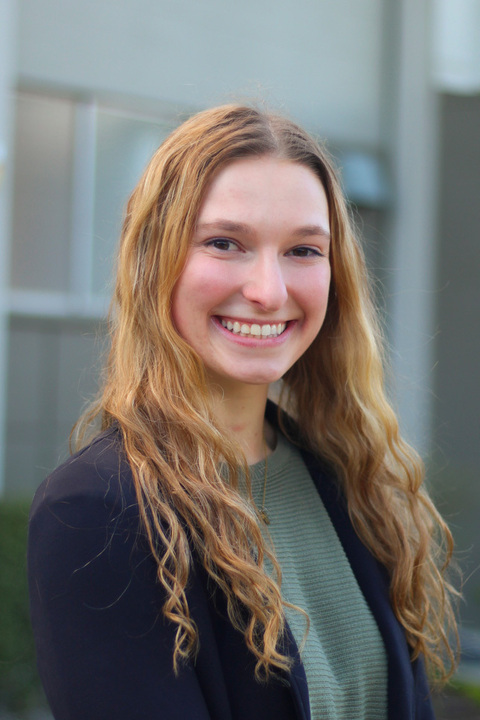
“Project management for systems change intervention is incredibly complex and not something I would have been able to learn without this hands-on experience.”
-Emily Blackwell, BS and MS Human Biology ’24
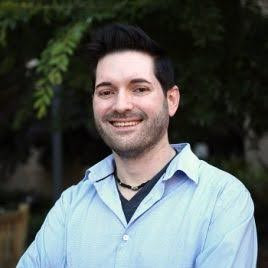
“The Living Lab Fellowship was more than an internship, extracurricular, or class to me. Instead, it helped showcase that the goals and values that I strive to achieve are present here at Stanford while giving me pathways to continue my journey.”
–Justin West, BS Computer Science ’25
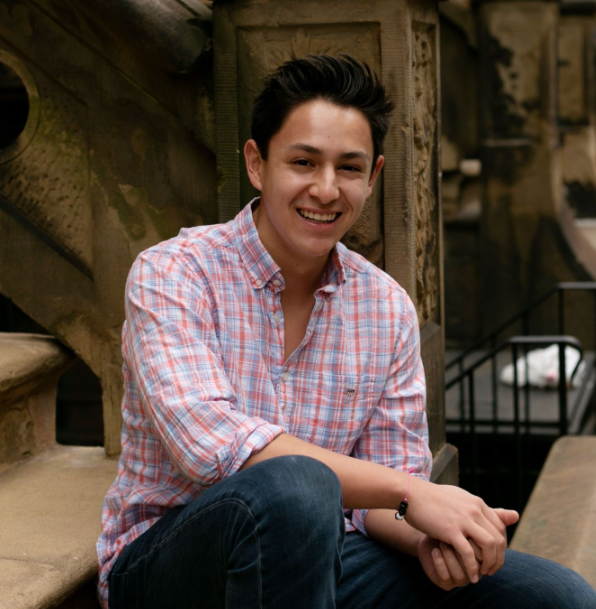
“This fellowship was an awesome experience! It provides an incredible opportunity to help make meaningful change on- and off-campus! I would recommend it to anyone. I learned a ton and feel like I gained such impactful work and life experience. I don’t think I’d have gotten my post-grad job if not for the skills I learned from the fellowship.”
-Jeremy Rubin, BA Human Biology and MA Public Policy ’24


Explore how students and campus partners are co-creating sustainability solutions that inspire change on campus and beyond.

Elanna Mak conducted outreach to promote the switch from plastic to recycled lab supplies and explored factors impeding sustainable alternatives for compounds.

Sammy Puckett, B.S. ’22, M.S. ’24, created narrative content to encourage Transportation site visitors to visualize changes for more sustainable commutes.

Yuan Tang, M.S. 2024, identified promising climate action plans for the Travel/Study program within the Stanford Alumni Association by analyzing emissions data.

Nikita Salunke helped shape Stanford’s electric vehicle (EV) charging infrastructure as a Living Lab Fellow.

Jeremy Rubin, M.A. in Public Policy ’24, explored carbon offsets for Stanford’s scope 3 emissions, and engaged with stakeholders and experts to help the university achieve net zero emissions.

Sergio Lopez used his fellowship to electrify Stanford’s Educational Farm, reducing emissions and leading the transition of small farms from fossil fuel dependency.